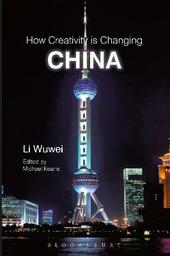
|
How Creativity is Changing China
Paperback / softback
Main Details
| Title |
How Creativity is Changing China
|
| Authors and Contributors |
By (author) Li Wuwei
|
|
Guest editor Sir Michael Keane
|
| Physical Properties |
| Format:Paperback / softback | | Pages:160 | | Dimensions(mm): Height 234,Width 156 |
|
| Category/Genre | Economics
Business studies - general |
|---|
| ISBN/Barcode |
9781849666169
|
| Classifications | Dewey:330.951 |
|---|
| Audience | | Tertiary Education (US: College) | | Professional & Vocational | |
|---|
|
Publishing Details |
| Publisher |
Bloomsbury Publishing PLC
|
| Imprint |
Bloomsbury Academic
|
| Publication Date |
30 September 2011 |
| Publication Country |
United Kingdom
|
Description
This book is available as open access through the Bloomsbury Open Access programme and is available on www.bloomsburycollections.com. The question Professor Li Wuwei investigates is not 'whether' creativity is changing China - but 'how' creativity is changing China. The outcome will have a profound impact on how China develops and its economic role in the world. Creative industries maintain and protect historical and cultural heritage, improve cultural capital, and foster communities as well as individual creativity. This leads to the improvement of cultural assets of cities, the establishment of city brands and identity, the promotion of the creative economy, and overall economic and social development. In this context, creativity is changing China forever.
Author Biography
Lu Weiwei is Vice Chair of the National Committee of the Chinese People's Political Consultative Conference and Chair of Shanghai Creative Industries, Shanghai Academy of Social Sciences, China. Michael Keane is Principal Research Fellow of the Australian Research Council Centre of Excellence for Creative Industries and Innovation, Queensland University of Technology, Australia.
ReviewsAn advanced economy initiates and designs; a powerful economy consumes as well as creates so that it is not dependent on overseas customers. This book will show you how China's is becoming both. As Li Wuwei reminds us China is 'rich in historical and cultural resources'. But Chinese culture has more than that. More than any other people, Chinese believe in the transformative power of education. Like the Italians they are critical consumers and they are as enterprising as Anglo-America's protestant forbears. With this book Li Wuwei shows us how this devastating combination is being harnessed and gives us clues as to what this means for the country's - and the world's - future economic development. He is an influential man with the ear of power; the reader can be confident that what he writes reflects what decision-makers are thinking. Professor Hugo de Burgh
|